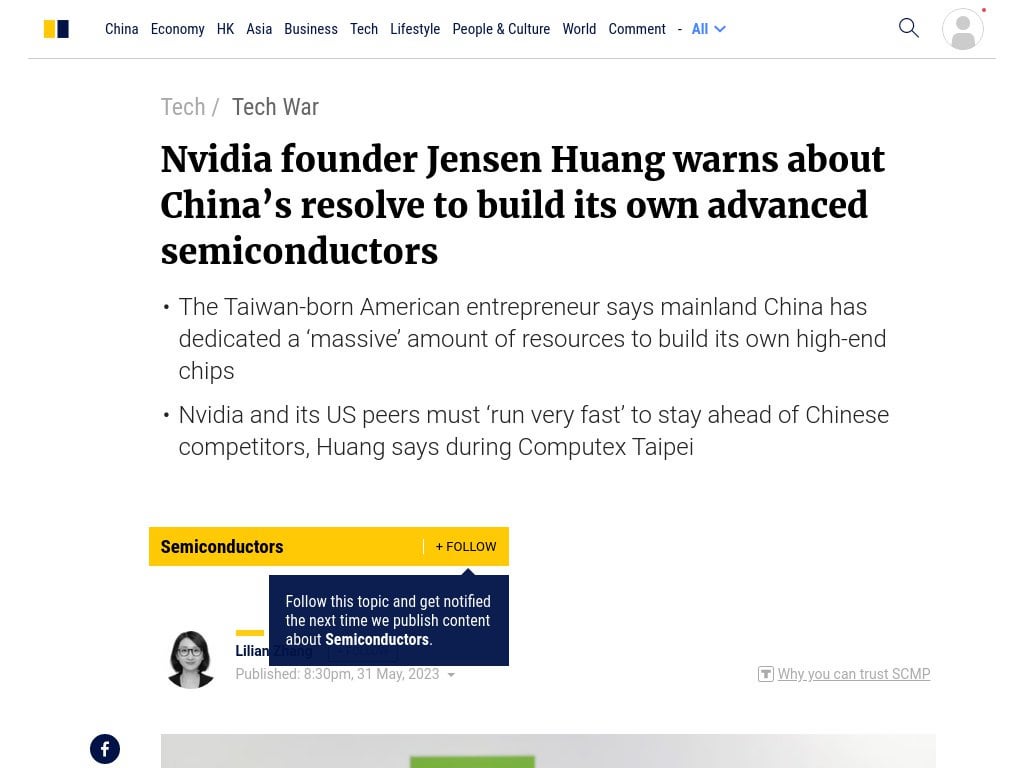Jensen Huang (Nvidia) Calls For Changes To US Export Control Policy

Table of Contents
Huang's Concerns Regarding Current US Export Control Policies
The current US export control policies, particularly those restricting the export of advanced chips, especially to China, are a primary concern for Jensen Huang and Nvidia. These restrictions, designed to address national security concerns and prevent the potential misuse of advanced technologies, have created significant hurdles for businesses like Nvidia.
- Impact on Nvidia and the Semiconductor Industry: The restrictions on exporting high-performance AI chips to China directly impact Nvidia's revenue streams and its ability to compete globally. This ripple effect is felt throughout the semiconductor industry, affecting not only chip manufacturers but also companies reliant on these advanced technologies.
- Hindering US Technological Advancement: Huang argues that overly restrictive policies stifle US technological advancement and competitiveness. By limiting access to advanced technologies, the US risks losing its edge in crucial areas like artificial intelligence and high-performance computing, potentially allowing other nations to surpass it.
- Unintended Consequences: These restrictions may inadvertently drive innovation elsewhere. Companies may shift production or research to countries with less stringent export controls, potentially undermining the very goals of the current policy. This could lead to a loss of intellectual property and strategic advantage for the United States.
Nvidia's Perspective: Balancing National Security and Economic Growth
Nvidia, while acknowledging the importance of national security, advocates for a more balanced approach to export controls. The company believes that overly restrictive policies can harm US economic competitiveness and technological leadership in the long run.
- National Security and Economic Growth are not mutually exclusive: Nvidia emphasizes that maintaining a strong national security posture does not necessitate stifling economic growth and technological innovation. A more nuanced policy can effectively address national security concerns without unduly hindering the growth of the US tech sector.
- A Nuanced Approach: Nvidia urges for a more precise and targeted approach to export controls, focusing on specific technologies and entities posing genuine national security risks rather than broad restrictions. This approach minimizes collateral damage to legitimate businesses and fosters a healthier innovation ecosystem.
- International Collaboration: Nvidia proposes a more collaborative approach with allies to address shared national security concerns while maintaining open channels for technological exchange and economic growth. This cooperative approach could enhance global supply chain resilience and innovation.
Proposed Changes and Their Potential Impact
While Jensen Huang hasn't explicitly detailed specific policy changes, his call for reform implies a shift towards a more targeted and less restrictive approach. This could involve:
- Refined Licensing Procedures: Streamlining the licensing process for exporting advanced technologies to reduce delays and uncertainties for businesses.
- Targeted Sanctions: Focusing sanctions on specific entities or technologies posing a clear national security threat rather than broad restrictions on entire sectors.
- Enhanced International Cooperation: Working with allies to establish common standards and regulations for exporting sensitive technologies.
The potential impact of these changes is significant. While some fear that less restrictive policies could increase the risk of technology falling into the wrong hands, others argue that a more balanced approach would stimulate innovation, enhance US competitiveness, and ultimately strengthen national security by fostering a more robust and resilient tech industry.
The Broader Implications for the Semiconductor Industry
Jensen Huang's call for change reflects a wider concern within the semiconductor industry about the impact of US export control policies. These policies are increasingly viewed as a key element in the escalating technological competition between the US and China, often referred to as "technological warfare."
- Geopolitical Implications: The US export control policy profoundly impacts global geopolitical dynamics, influencing alliances and shaping international relations in the tech sector.
- Future of Computing: The outcome of this policy debate will significantly affect the future of computing and artificial intelligence, determining which nations lead in these crucial technological domains. A more restrictive policy could accelerate the development of alternative technologies in other countries.
- Global Semiconductor Market: The global semiconductor market is highly interconnected; therefore, changes in US policy ripple across the world, impacting supply chains, prices, and innovation globally.
Conclusion:
Jensen Huang's urgent call for reform of US export control policy highlights the critical need for a balanced approach that effectively safeguards national security while fostering US economic growth and technological leadership. His arguments underscore the significant challenges facing the semiconductor industry and the broader tech sector under the current system. The proposed changes, while potentially risky, could lead to a more robust and competitive US tech industry, contributing to a more dynamic and innovative global technology landscape. Follow the debate surrounding Jensen Huang's call for reform of US export control policy and learn more about the impact of export controls on the semiconductor industry. The future of this crucial sector hinges on thoughtful consideration of these critical issues.

Featured Posts
-
 Coldplays Top Concert A Review Of Music Visuals And Meaning
May 22, 2025
Coldplays Top Concert A Review Of Music Visuals And Meaning
May 22, 2025 -
 Ukrayina Ta Nato Yevrokomisar Poperedzhaye Pro Seryoznu Nebezpeku
May 22, 2025
Ukrayina Ta Nato Yevrokomisar Poperedzhaye Pro Seryoznu Nebezpeku
May 22, 2025 -
 The Goldbergs Character Development And Lasting Appeal
May 22, 2025
The Goldbergs Character Development And Lasting Appeal
May 22, 2025 -
 Extensive Damage 600 Foot Chicken Barn Fire In Franklin County
May 22, 2025
Extensive Damage 600 Foot Chicken Barn Fire In Franklin County
May 22, 2025 -
 L Incroyable Architecture Toscane De Nom De La Ville Une Petite Italie
May 22, 2025
L Incroyable Architecture Toscane De Nom De La Ville Une Petite Italie
May 22, 2025
